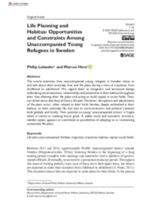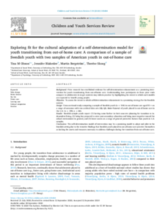Displaying 31 - 40 of 138
Through the lens of primary (ability‐driven explanations) and secondary (choice‐based explanations, conditional on educational performance) effects on social background differentials in educational attainment, longitudinal data from more than 14 000 Swedes (of which around 9% have been placed in out‐of‐home care (OHC)) were used to estimate the relative importance of these two basic explanatory processes.
This study investigates the extent and causes of child abandonment and various practices and services in relation to prevention of child abandonment in Denmark and other high-income countries.
This article explores birth parents’ views on their needs and perceptions of support delivered by two different interventions: one offering support to individuals and the other providing a parental group.
For this study, responses from 311 students in out‐of‐home care (OHC) were compared with peers living in birth parent care (BPC) and in single birth parent care (sBPC) in a regional school survey, directed to students in compulsory school eighth year and upper secondary school second year.
This article examines how unaccompanied young refugees in Sweden relate to and talk about their everyday lives and life plans during a time of transition from childhood to adulthood.
Prior research has established evidence for self-determination enhancement as a promising intervention for youth transitioning from out-of-home care. The purpose of this study was to assess the extent to which self-determination enhancement is a promising strategy for the Swedish context.
Based on three waves of semi-structured interviews, this longitudinal qualitative study aims to understand the transition from out-of-home care (OHC; foster care, residential care) to independent adulthood, for a group of Swedish care leavers aged 16 to 20 years.
This study’s objective was (1) to investigate if having parent(s) born outside of Europe has an additional effect on the risk of entry into out-of-home care (OHC) in cases of alleged parental physical violence against children, and (2) to discuss potential empirical support for the risk model and the bias model for explaining the over-representation.
The aim of this paper is to describe and analyse the notion of age and maturity in child protection proceedings in order to elucidate how these aspects could influence children's rights to participate.
The aim of this study was to examine the experiences of mothers regarding their mothering role after participation in the ‘Mamma Trots Allt’ (MTA) program, a support program for mothers with cognitive limitations who have children in placement.


